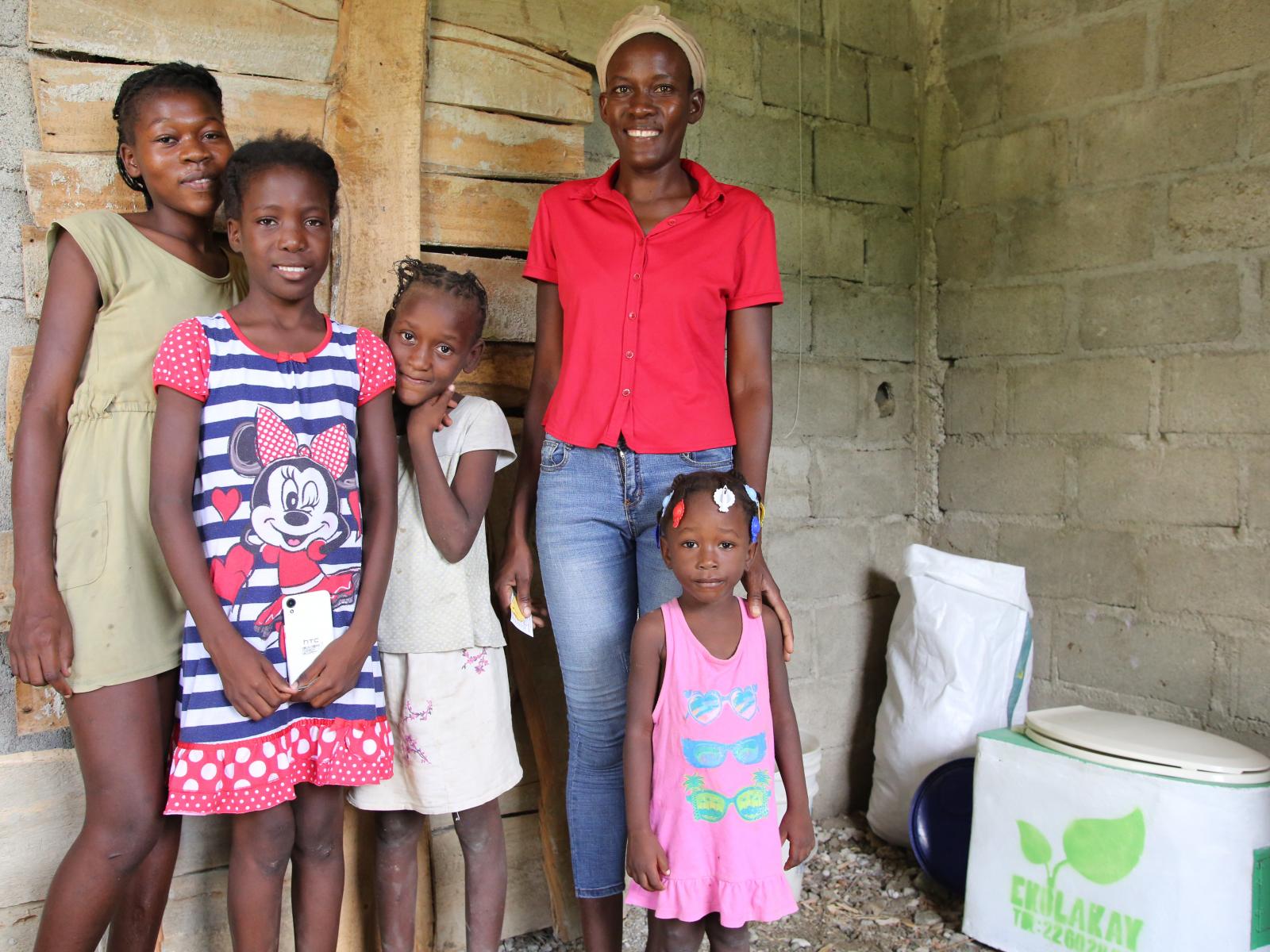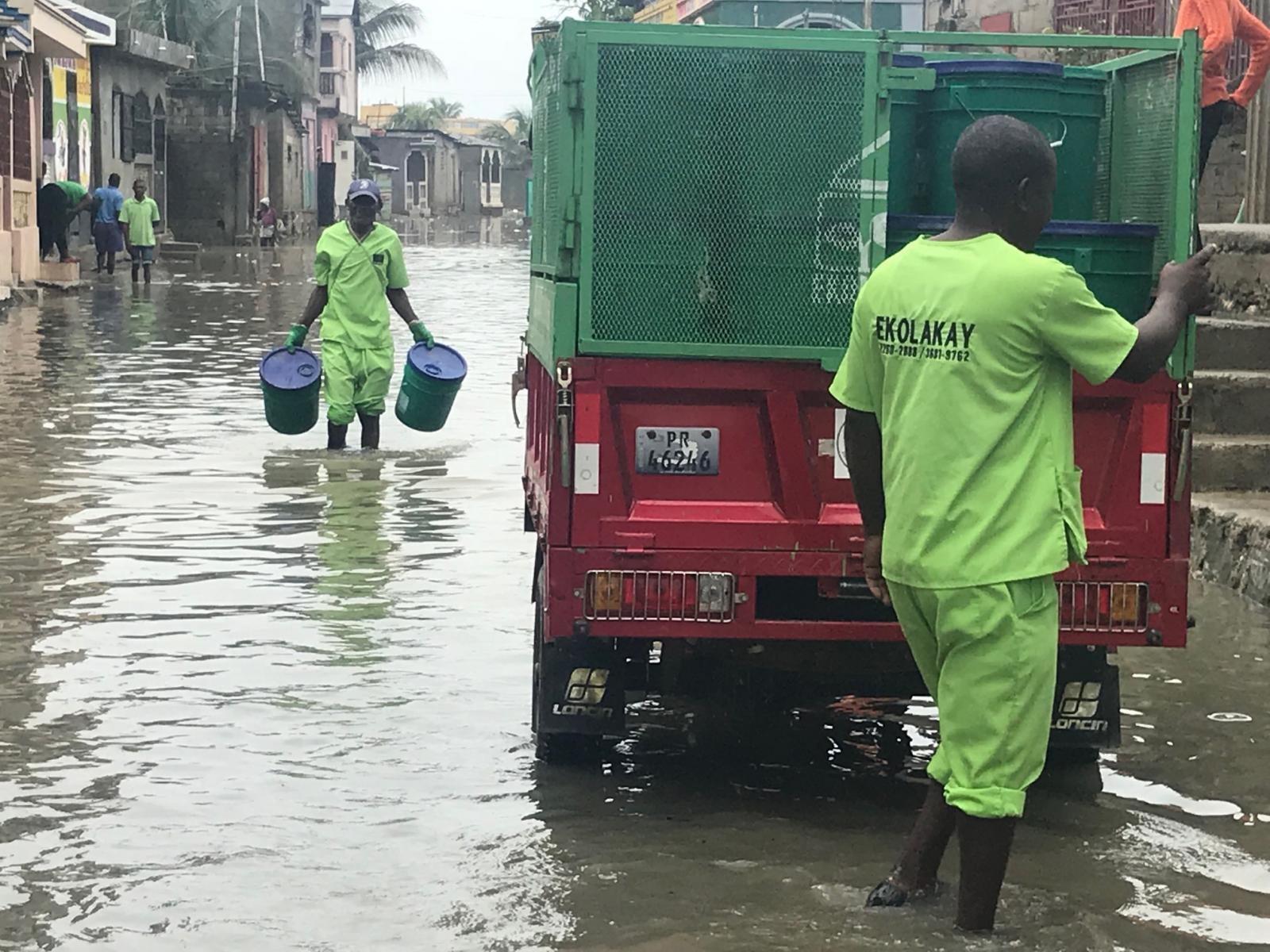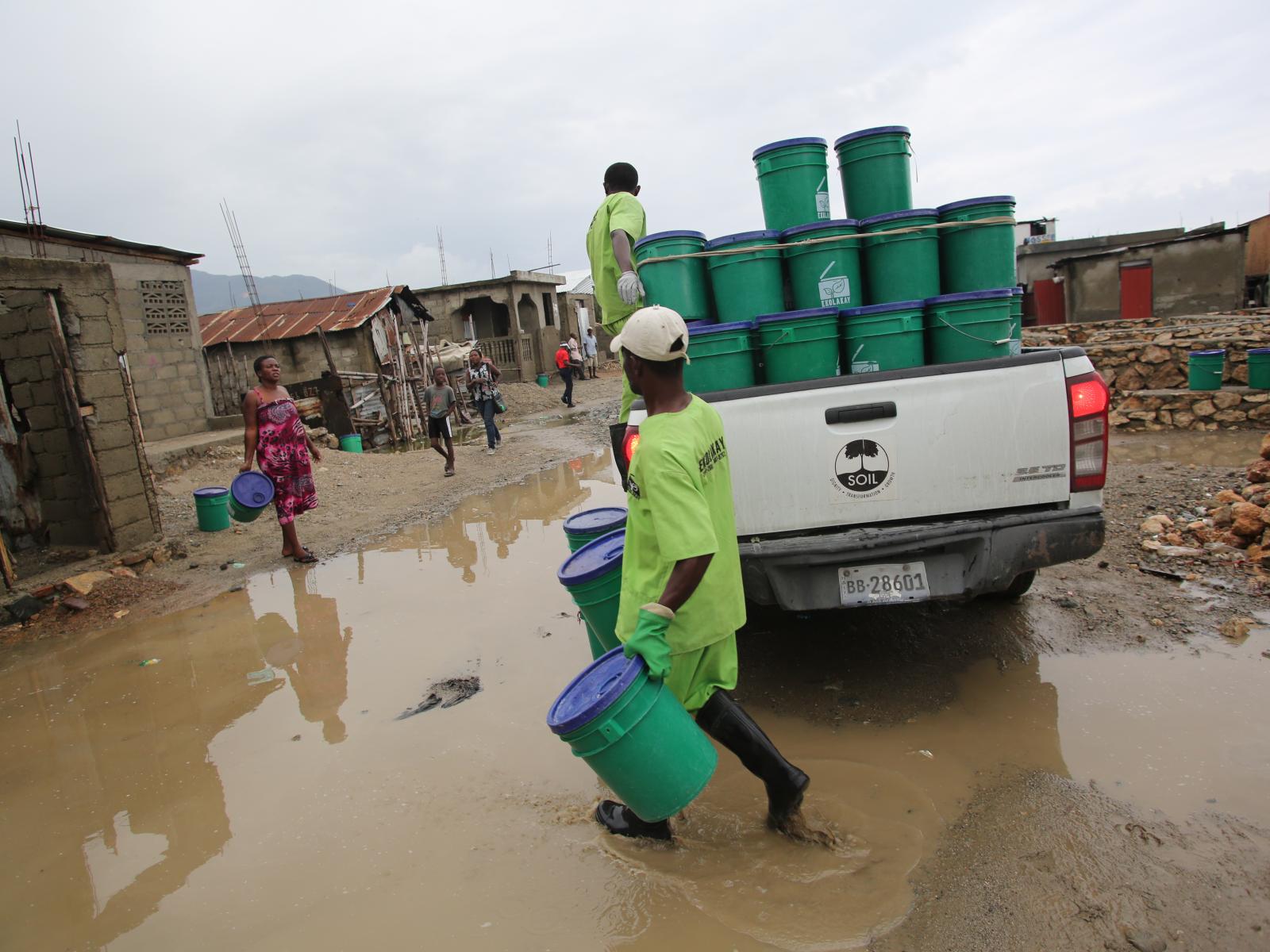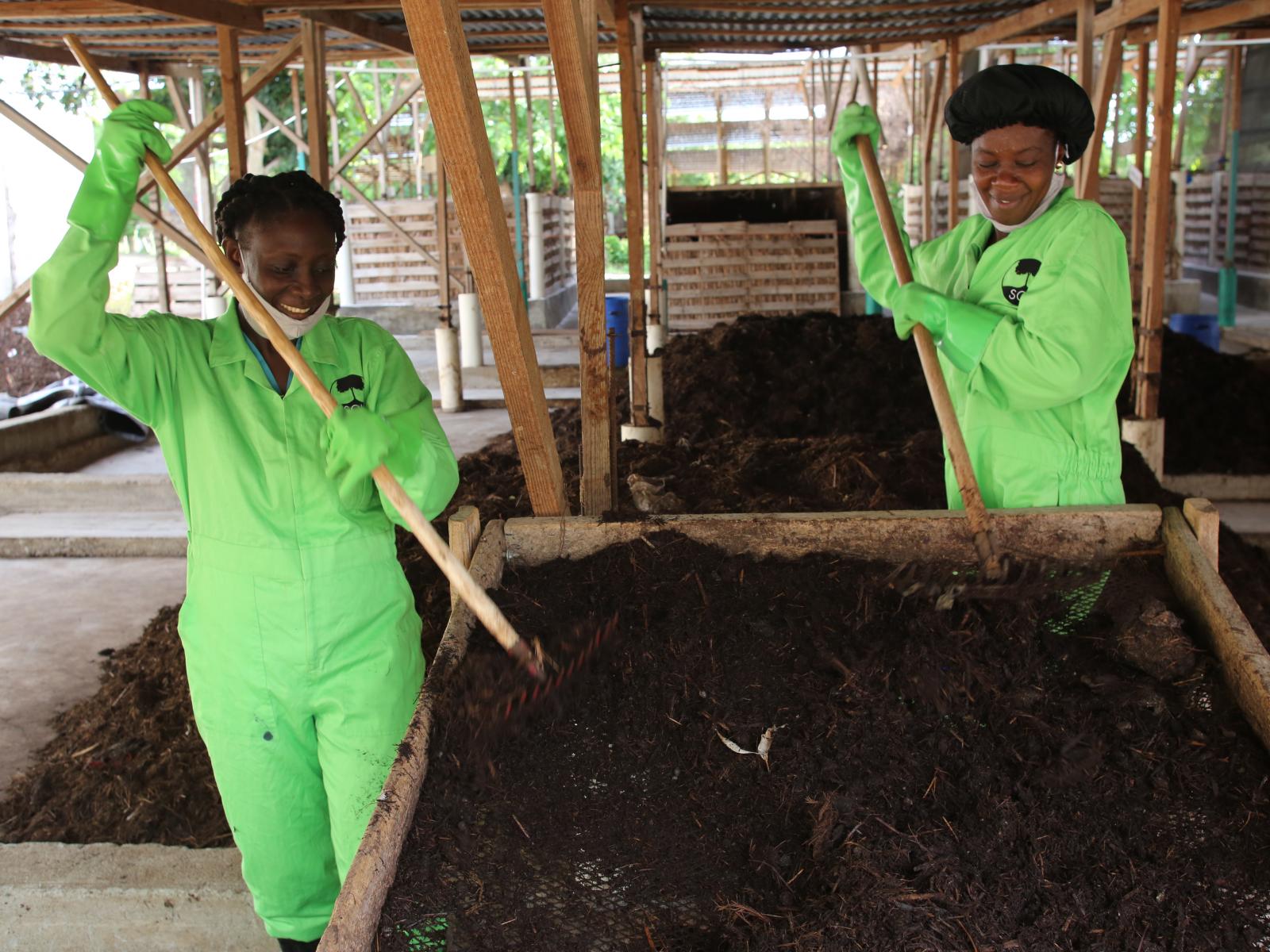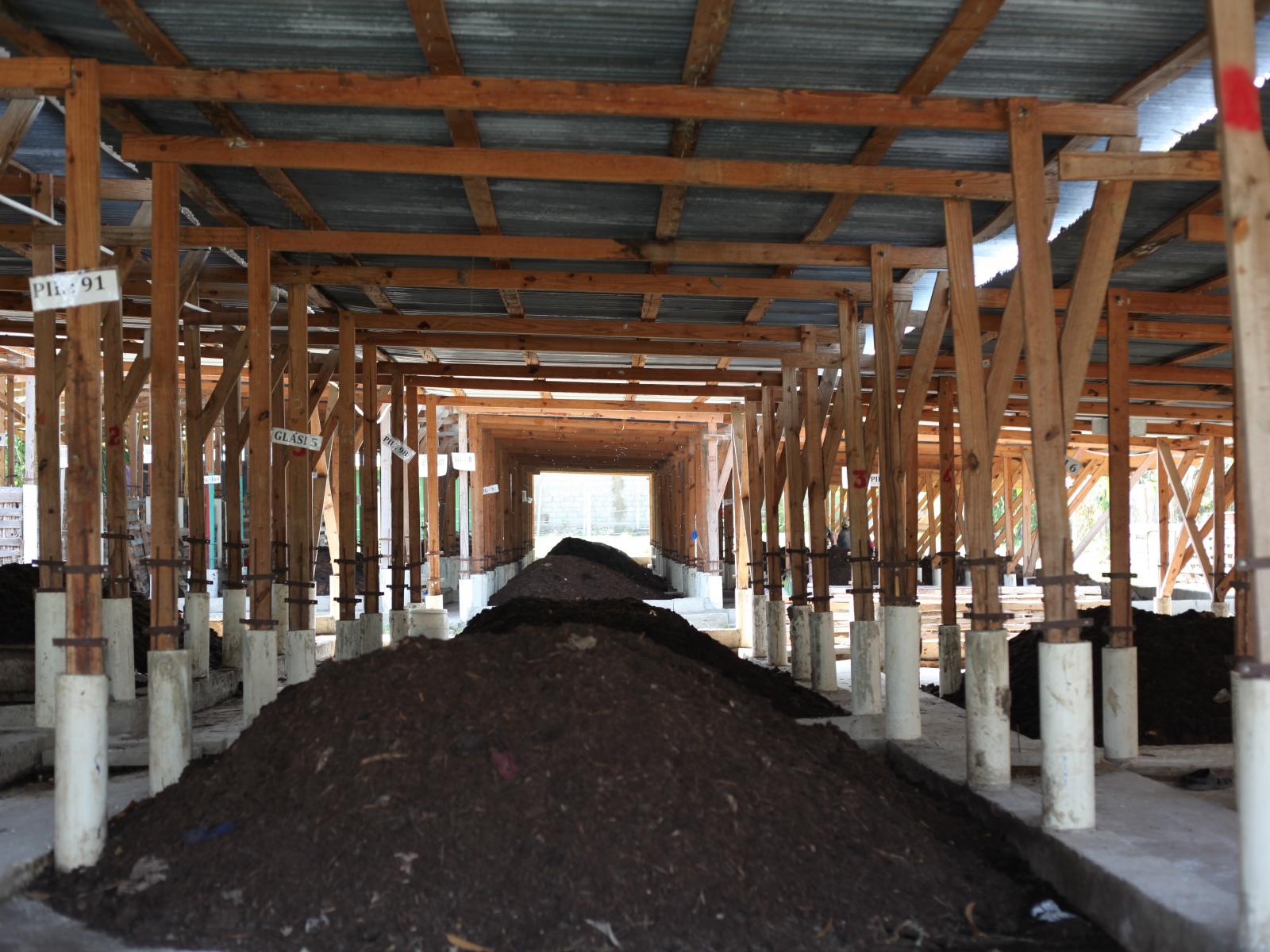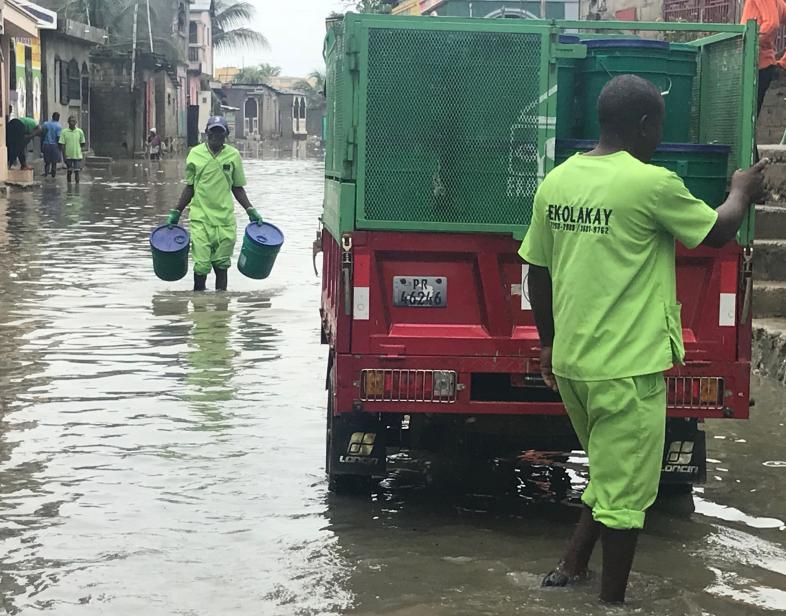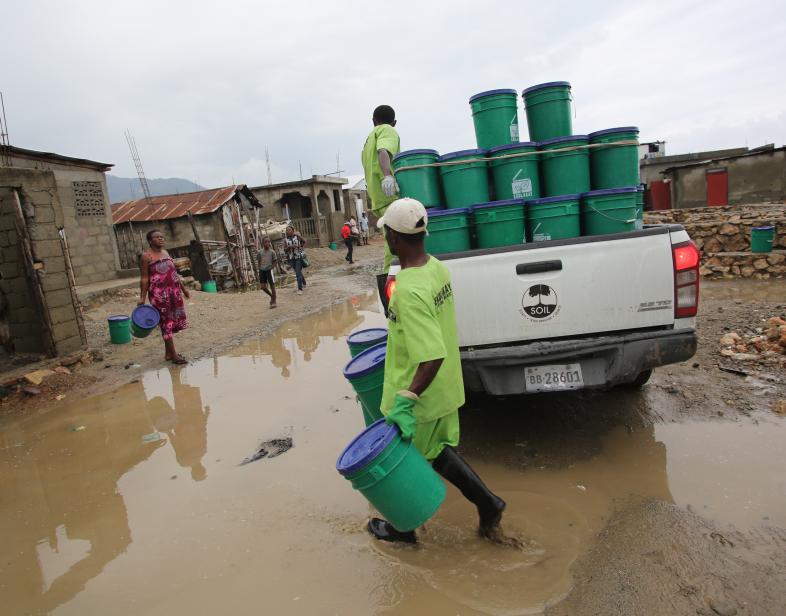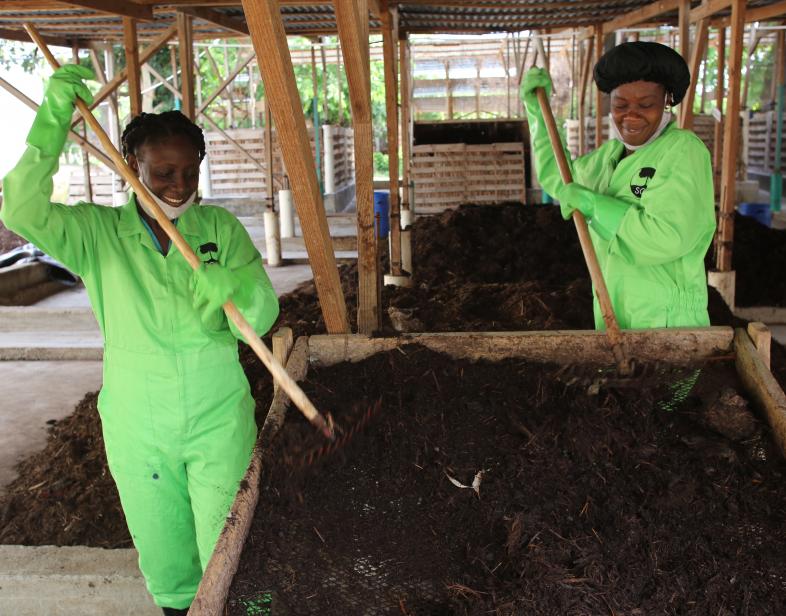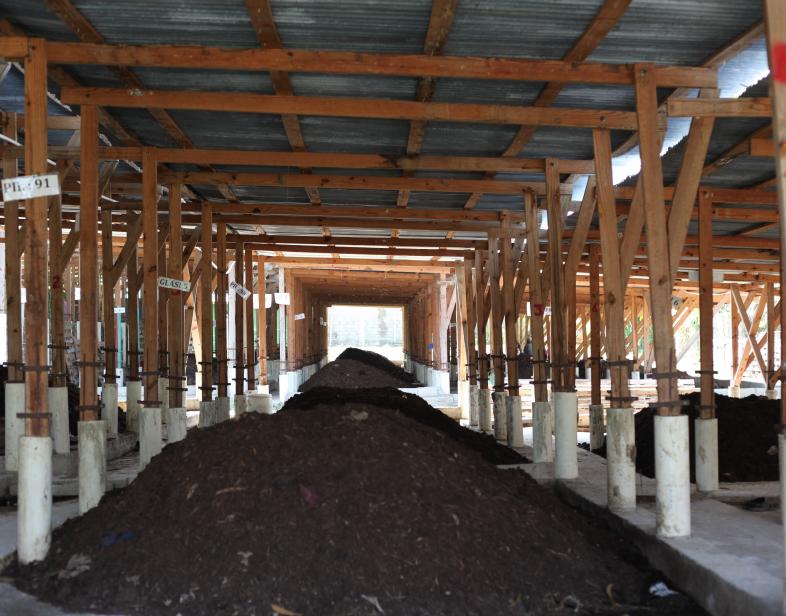An Overview Of Our Solution
SOIL’s solution focuses on providing dignified ecological sanitation in vulnerable and underserved urban areas where traditional technologies have failed. SOIL’s innovative program simultaneously addresses the interconnected crises of poor sanitation and environmental degradation by using a circular economy solution that encompasses the full sanitation cycle from household toilet provision, to waste collection, to nutrient recycling and transformation into organic compost for agriculture development and reforestation initiatives. SOIL’s model is working to not only instigate hygienic and environmental behavior change in the sanitation, agriculture and environmental sectors in Haiti, but to also transform global perceptions about human waste, promoting a new vision for environmental sustainability through changing the way we view and manage waste.
- Population Impacted: Currently 8,600
- Continent: North America
姓
名
机构类型
电子邮件
视频文件
背景分析
Haiti has the lowest rates of access to improved water and sanitation infrastructure in the western hemisphere. Only 34% of urban Haitians have access to improved sanitation facilities and less than 1% of human waste is safely treated. The country is home to the highest incidence of childhood diarrhea in the world and poor sanitation access has resulted in a devastating public health crisis. As nutrients from human wastes contaminate water supplies, Haiti’s once fertile soils are rapidly degrading due to erosion and intensive agriculture. Agricultural production has declined for the past 2 decades resulting in more than 20% of children being malnourished. Poor sanitation and soil erosion are the key factors affecting the health of aquatic ecosystems in Haiti and SOIL’s holistic model addresses this problem by ensuring that nutrients from human waste are returned to the soil, simultaneously protecting water resources, reducing waterborne disease and revitalizing degraded soils.
描述您希望目标受众采用的技术解决方案。
SOIL's lifesaving sanitation service is tackling one of the world's toughest challenges with a new technology called container-based sanitation (CBS). CBS is a system where toilets collect human waste in sealable, removable containers that are transported to treatment facilities when full. In SOIL’s service, EkoLakay, families pay a small monthly fee and SOIL provides toilets, waste collection, and safe treatment of wastes; transforming it into compost. Revenues from toilet user fees and compost sales support ongoing project costs and showcase the potential to affordably provide household sanitation in the world’s most impoverished urban communities. In a world where the majority of sanitation technologies are cost prohibitive and too water intensive for low resource settings, SOIL’s full cycle CBS solution allows for the protection of water resources in urban communities, while reducing reliance on synthetic fertilizers in rural areas.
描述你的行为干预。
Interventions simply do not work unless they are community driven, designed and supported at all stages of development and implementation. Since SOIL’s start, we’ve worked closely with the communities we serve and the Haitian government to develop a sustainable solution that targets the real, rather than perceived needs of these stakeholders. Three main behavioral intervention areas became a priority in order to build SOIL’s service and model: 1) Willingness to pay: To respect the Haitian government’s regulation for household sanitation to have a fee for service model, SOIL worked closely with customers to understand willingness to pay. Out of these ongoing discussions, SOIL emotionally appealed to people’s sense of pride in having access to an in-home toilet. SOIL has conducted peer reviewed research which indicates that people are willing to pay for the service for reasons of security, dignity and comfort. 2) Household toilet vs traditional sanitation options: SOIL recently implemented an expansive local marketing campaign using billboards with emotional and social appeals to depict the advantages of using a household toilet versus using a pit latrine or open defecation. 3) Nutrient recovery from human waste: Motivating agricultural producers to value the use of recycled nutrients in human waste, required SOIL to research, test and provide scientific evidence of both a pathogen-free end product and evidence of benefits to the soil for successful adoption.
使用的行为杠杆
如需要,请更详细地解释你是如何使用杠杆的。
SOIL uses emotional appeals and social influence levers in marketing to help promote the use of safely managed sanitation. Messaging includes invoking pride in switching to a sanitation option which is dignified and safe for the environment when compared to pit latrines which pollute critical water resources, and sense of security, particularly for women that have to use unsafe public sanitation. Sharing information has been critical to expanding growth, providing information on the public health risks of not using safely managed sanitation and educating on the holistic benefits. SOIL uses incentives including removing barriers for beneficiaries by facilitating multiple payment options, distribution of hygiene kits for customers, and phone cards on important holidays. Monetary incentives, such as referral payments, are used to expand service. SOIL works in partnership with the Haitian government to strengthen the regulatory framework to support safe sanitation adoption.
描述项目的实施。
SOIL’s circular economy approach reduces water pollution though the following primary activities: 1) Provision and expansion of household sanitation service: SOIL currently provides over 1,400 households with household toilets and weekly waste collection that otherwise do not have access to improved sanitation. SOIL safely removes over 400 tons of waste from densely populated settlements annually; mitigating the risk of water contamination and environmental pollution. 2) Provision and expansion of waste treatment service: SOIL currently operates one of only two waste treatment facilities in Haiti and safely treats 100% of the toilet wastes collected in our toilets, transforming it into compost. SOIL produced over 100 tons of compost last year that will be used to reduce reliance on synthetic fertilizers and promote soil fertility, water retention, and food security. 3) Strengthening public-private partnership for the sustainable provision of sanitation services in urban Haiti: SOIL is working closely with the Haitian government and development banks to create a mechanism for future public financing of sanitation in Haiti which is key to replicability within Haiti and in other fragile states globally. This signifies a potential groundbreaking paradigm shift in how sanitation services are provided to rapidly expanding and vulnerable urban communities using a circular economy model. 4) Continued contribution to sector learning: SOIL works closely with academic partners to produce peer-reviewed research to share lessons learned in Haiti with the global sanitation sector. SOIL is also a founding member of the Container-based Sanitation Alliance, a group of practitioners working to create standards for CBS and tools to promote replication globally. These efforts are designed to have an immediate positive impact on our ability to provide user-approved, affordable sanitation services in Haiti as well as to contribute to innovation in the sanitation sector at large.
描述项目的主导者。谁在主导项目实施?
SOIL is led by a collaborative Executive management team of 7 directors with specialized skill sets who report to a volunteer Board of Directors made up of members of the community of donors, volunteers, and allies of the organization who display the professional experience, dedication, and responsibility needed to lead SOIL. 87% of SOIL’s staff are Haitian and the primary implementers of the day to day activities of SOIL’s sanitation service. In order to implement the most appropriate and community-driven solution, SOIL has cultivated a leadership team in Haiti with diverse experience and local knowledge that includes environmental engineering, ecology, sales, marketing, supply chain engineering, operations and human resources. SOIL’s solution was built using a model of extensive community input and collaboration that values addressing real needs versus perceived needs of the communities where we work.
分享参与解决方案开发和实施的关键合作伙伴。
In order to set the course for long-term sustainable change, SOIL collaborates closely with a wide variety of stakeholder groups and is committed to sharing research for sector development. SOIL’s work would not have achieved the impact it has to date if it weren’t for the close collaboration and support of the following stakeholder groups:
(a) Community groups: Before working in any new community, SOIL reaches out to community-based organizations (CBOs) and local leaders. The communities where we work are an integral component of the entire solution from design iterations, to manufacturing, sales, collection, waste treatment, research and agriculture application.
(b) Public sector: SOIL works closely with the Government of Haiti, relevant ministries, and local authorities in order to ensure that activities complement existing programs, meet priority needs, and fit into long-term planning objectives.
(c) International Financing Institutions: Over the years SOIL has developed many partnerships and consultancies with financing organizations that are committed to developing a long-term sustainable model for sanitation in vulnerable urban populations.
(d) Businesses: SOIL works with local sanitation-sector businesses and B2B providers to reduce SOIL’s costs for providing sustainable sanitation services in Haiti and to support the creation of permanent jobs and diversified income sources.
谁采用了期望的行为,采取的程度如何? 解释一下你如何测量行为变化的。
Urban residents without access to safe, hygienic and dignified sanitation. This beneficiary group is comprised of families that live in impoverished urban and peri-urban neighborhoods of northern Haiti, where traditional sanitation technologies have proved difficult or impossible to implement. Because of the demonstrated need for improved sanitation interventions in urban communities and the remarkably low costs of providing EkoLakay container-based toilets, target beneficiaries include Base of the Pyramid populations where the majority of people live below the poverty line, and over 80% of beneficiaries have never had a toilet. To better understand the behavioral impact of SOIL's service, we recently conducted a churn study that examined the sanitation trajectory of beneficiaries that have used the service, revealing the long lasting impacts for sustained behavior change, where those who joined the service continued to use an improved sanitation option after leaving the service.
项目是如何影响水污染的?请详细说明并包括相关的测量方法。
SOIL’s solution protects water resources in Haiti in multiple ways, primarily through: 1) Preserving scarce water resources through water savings: SOIL’s container-based waterless toilets save an estimated 19,200 gallons per year per toilet compared to flush toilets. 2) Protecting groundwater, surface water and coastal waters from untreated waste contamination and pollution: SOIL uses a robust waste treatment KPI database to record waste collection, treatment and transformation. SOIL removes over 40 metric tons of waste EVERY MONTH and safely transports it out of dense urban communities to treat at our composting waste treatment site. 3) Rehabilitating degraded soils: healthy soils are a primary defense against water pollution and studies have demonstrated that compost application increases soil water retention capacity, increases microbial diversity and stimulate increased plant growth, all of which are critical components of protecting aquatic ecosystems.
您的解决方案如何促进平等(包括种族、性别、民族、社会阶层/收入,或其他)?
SOIL’s solution is particularly committed to implementing strategies that promote social class equity and gender equity through advocating and providing an affordable sanitation service to previously under-served and overlooked communities. Expanding sanitation access to these communities promotes dignity, stimulates job creation and invests in the health and well-being of the community and its members. Further, this solution is critical for promoting gender equity for women and girls. It is well documented that lack of access to sanitation disproportionately affects women and girls; failing to meet even the most basic menstrual, sexual and reproductive health needs and exacerbating social and economic inequities. Having access to a simple in-home toilet provides a safe, private and secure space for women and girls' basic hygiene needs and mitigates the risk for physical and sexual violence.
社会和/或社区是如何受益的?
SOIL’s solution was carefully designed to maximize benefits at all points of the sanitation cycle. However, we continue to see the social impacts as an organization that is deeply rooted in the communities we serve. None more evident than over the past year with the COVID-19 pandemic where SOIL was able to quickly provide support to local authorities with public toilets and handwashing stations and dissemination of critical hygiene information to reduce the spread of the disease in Haiti.
环境是如何受益的?
Expansive environmental benefits are built in to SOIL’s model which include, compost production for application on reforestation and soil erosion projects, promotion of cleaner and greener communities, and groundbreaking research on the potential for climate mitigation in the sanitation sector through composting waste treatment.
可持续发展如何得到促进?
Sanitation is truly at the core of sustainable development, yet the additional benefits of using a circular economy model where human waste is transformed into a resource allows for further impacts that promote food security, create dignified livelihood opportunities in poor rural and urban communities in the sanitation and agriculture sectors and builds a resilient cycle that returns nutrients from urban communities back to rural farms where the food is grown.
可持续性:描述你的解决方案的经济可持续性。
At SOIL we seek to prove that it is possible to sustainably provide safely managed sanitation services even in the world’s most impoverished urban communities. However, sanitation is a public good that is subsidized in even the most developed countries, and the key to creating economic sustainability of SOIL’s solution is developing a replicable financing mechanism to replace philanthropic revenues with a combination of user fees, carbon credits and government subsidy. SOIL is in discussions with the Inter-American Development Bank (IDB) and the Haitian government to develop a results-based financing mechanism paid for by IDB and disbursed through the government to build a bridge to a future public-private partnership.
投入产出:实施这些活动的成本是多少?与你上面的结果相比,你的结果如何 这投资吗?
SOIL’s service currently costs approximately $40 per household per month, equivalent to $80 per capita per year and this could be reduced to $20 per capita per year with scale. Although sanitation services seem expensive, scientific evidence demonstrates that the benefits far outweigh costs when the definition of benefits includes direct health gains and increased time savings. Improved sanitation also has positive impacts on water resource protection, environmental sustainability, health and gender equality. Although SOIL’s direct implementation efforts reach just over 8,000 people currently, the global economic impacts of replicating this technology could be substantial with an estimated return on investment of $9 for every $1 invested.
如何能将这个解决方案成功推广在其他地方?
SOIL’s work demonstrates the potential for global scalability in that this solution is one of the only successful models for providing low-cost, dependable, and environmentally-sound household sanitation to water-scare urban communities, and it represents an elegant public health and environmental intervention for a rapidly expanding and vulnerable population at the base of the pyramid. Given the sheer number of people requiring access to these services, there is significant demand to drive large-scale investment in this model. Through research collaborations, progress toward developing a sustainable financing mechanism, and extensive educational outreach programs, SOIL is working to disseminate findings widely to facilitate the global replication of this holistic approach to sanitation and climate protection. Since SOIL pioneered CBS in 2009, at least 9 other similar services have been developed globally and the CBSA was developed specifically to encourage global replication.

